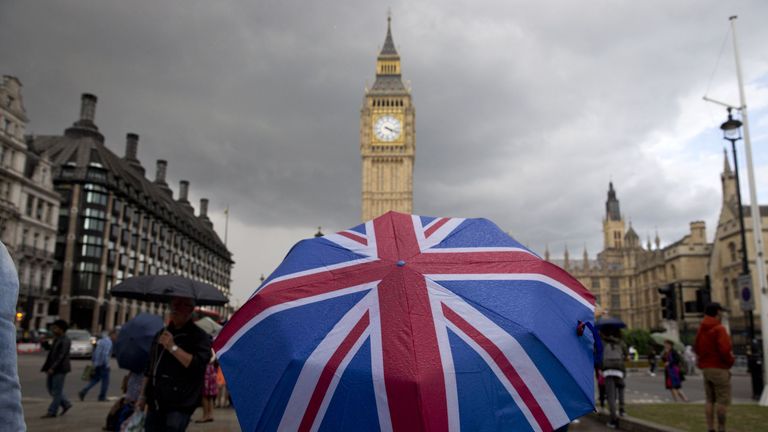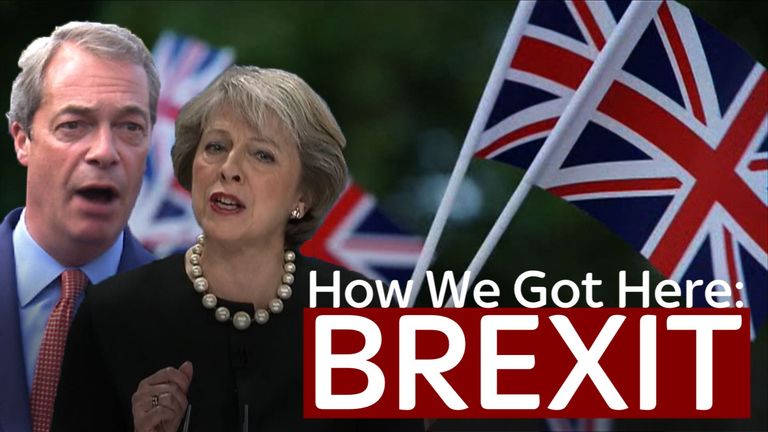Meagre flesh on bones of May's Brexit plan
Sky's Robert Nisbet looks at whether the hastily written White Paper has added more than some diagrams to what we already knew.
Sunday 5 February 2017 16:48, UK
The Brexit White Paper had to be dragged out of the Government - and it shows.
The document is designed to set out Government policy ahead of legislation, but it takes Theresa May's 12-point Plan For Britain as the skeleton and adds meagre flesh to the bones.
In the Commons on Tuesday, Iain Duncan Smith suggested the Government just repeat her bullet points "with a couple of diagrams, the odd explanation and a nice picture".
The civil servants charged with bashing out this , before the bill allowing the PM to officially trigger the EU divorce moves to committee stage, seem to have taken him at his word.
The most contentious elements may be the suggestion that any transitional arrangements may cover immigration and trade (free movement and European Court of Justice jurisdiction could continue for a few years?).
But much of the space is filled with short essays on such subjects as "The Recent History Of Devolution" and "Dispute Resolution Mechanisms", but this is essentially context and contains scant new information.
The Government argues it doesn't want to box in its negotiators at such an early stage but MPs, who have been given a role in triggering the process, may well have expected more to chew over.
The White Paper on Scotland's Future, published in 2013, ran to 670 pages and went into forensic policy detail on the implications of independence.
Brexit Secretary David Davis argues there will be more substantial White Papers on future Brexit-related legislation, such as the Great Reform Bill, but those hoping to debate minutiae at next week's committee stage will be disappointed.
So what can we glean from the document in the following areas?
:: Immigration
After graphs setting out previously published immigration statistics and the pressure the "sheer volume" has put on public services, it states the case for new legislation to control who comes in to the UK.
It praises the contribution made by students and skilled workers and says the Government is "considering very carefully" the options, but doesn't spell out what those options may be.
There is one subtle admission: immigration controls may have to be phased in gradually. That won't go down well with ardent Brexiters.
:: EU nationals and Brits abroad
Amid immigration statistics (from 2011) the Government reiterates that "securing the status of, and providing certainty to, EU nationals already in the UK and to UK nationals in the EU" is a priority.
While there is talk about "talk" with various "stakeholders" about how to do this, no suggestions are forwarded apart from the platitude: "It is the right and fair thing to do."
:: Ireland
Again there is more contextual analysis of trade and cross-border movements between Ireland and the UK and we learn that "frictionless" is the Government's buzzword of choice.
But short of promising to "work" with the Irish government and the Northern Ireland executive, no concrete proposals are advanced.
:: Customs Union
Leaving the Customs Union is one of the most contentious issues, especially for those remainers who voted to trigger the process, but not at any cost to the UK economy.
But again "frictionless" is deployed by the civil servants as an aspirational catch-all, saying the Government has an "open mind" on how new customs arrangements with the EU will work.
:: Final Deal
The White Paper does reassure MPs that they will have a vote on the final deal, though there is no attempt to meet Labour's Sir Keir Starmer's "meaningful" threshold by spelling out what would happen if they voted it down.
One final observation: there is a curious line which seems to suggest the Government is acting to respond to perception rather than fact.
It states: "Whilst Parliament has remained sovereign throughout our membership of the EU, it has not always felt like that."
Is that an attempt at a back-out clause if the negotiations run aground? That they were acting to soothe an aggrieved electorate rather than a genuine problem?







